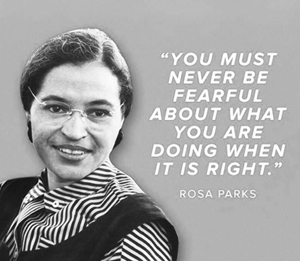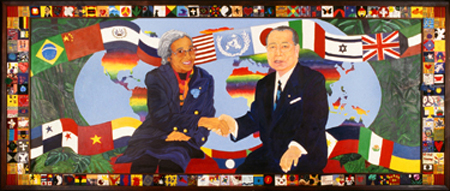Anthony Nicholas Remembers Rosa Parks
- Details
- Category: Leaders, Activists
- Published on Wednesday, 24 February 2016 15:29
- Written by World Tribune
 This article is reprinted with permission from the World Tribune. For more information on that publication, visit www.sgi-usa.org.
This article is reprinted with permission from the World Tribune. For more information on that publication, visit www.sgi-usa.org.Tony Nicholas, director of the Tom Bradley Family Source Center in Los Angeles, spoke on Oct. 4 at the SGI-USA World Culture Center in Santa Monica, California. Mr. Nicholas shared his recollections of the two meetings between his dear family friend Rosa Parks and SGI President Ikeda. The World Tribune sat down with him to discuss those encounters as well as other memories from his extraordinary life.
Nicholas: When I was 8 years old my mother remarried a lawyer named Leo Branton Jr. He was the first African American entertainment attorney in the 1950s. His clients included Nat King Cole, Dorothy Dandridge, Lena Horne, Miles Davis and Richard Pryor.
Later, he got more involved in the U.S. Civil Rights Movement and traveled throughout the South. When Dr. Martin Luther King Jr. and other civil rights leaders would get arrested, my stepfather would be the one to get them out. I was able to travel with him and meet both Dr. King and Rosa Parks.
 WT: Rosa Parks is revered throughout the world for refusing to give up her bus seat to a white passenger in Montgomery, Alabama, on Dec. 1, 1955. Mrs. Parks’ resistance and the Montgomery Bus Boycott that followed became important catalysts for the Civil Rights Movement. We understand that Mrs. Parks was a close family friend. What was she like?
WT: Rosa Parks is revered throughout the world for refusing to give up her bus seat to a white passenger in Montgomery, Alabama, on Dec. 1, 1955. Mrs. Parks’ resistance and the Montgomery Bus Boycott that followed became important catalysts for the Civil Rights Movement. We understand that Mrs. Parks was a close family friend. What was she like?Nicholas: Although presidents, kings and queens held Mrs. Parks in high esteem, and the people saw her as an icon, she remained such a humble woman. I learned from her to treat all people with compassion, and it’s something that I’ve carried into my own life as the director of the Tom Bradley Family Source Center. Every person who walks into my community center, whether it be the mayor of the city or a homeless individual, will get the same treatment. I learned this from Mrs. Parks.
Years later, my stepfather invited Mrs. Parks to stay in Los Angeles for six months out of the year to escape the cold in Detroit. So for 10 years, Mrs. Parks stayed at my family’s home in Los Angeles during the cold months. Every time I would go home, there was Rosa Parks, sitting on the couch drinking a cup of tea.
WT: What is your favorite memory of her?
Nicholas: I have many, but one time, when my daughter Nicole was in the first grade, we came over to my parents’ house to watch football. Nicole had a history report due, and she had to learn this poem about Rosa Parks. I went into the kitchen for a glass of water and saw Mrs. Parks patiently teaching my daughter a poem about herself. I’ll never forget that moment.
WT: You introduced Mrs. Parks to the SGI and President Ikeda. How did that come about?
Nicholas: My longtime friend Joe Perez first taught me about the philosophy and history of the SGI and Dr. Ikeda. He shared that Dr. Ikeda was an admirer of Dr. King and Mrs. Parks for their fight for the civil rights of African Americans.
On Jan. 30, 1993, Joe and I brought Mrs. Parks to the [former] campus of Soka University of America [in Calabasas, California] to meet Dr. Ikeda.
WT: What was your impression of their first meeting?
Nicholas: I will never forget it. When Dr. Ikeda arrived, he very humbly greeted each person. The first thing that struck me was his presence. Although he’s not a tall man, I felt like I was with a giant! Then, the two sat down and began to talk as if they had been friends for decades. I thought: My God, these two icons, who are so admired all over the world, are coming together. What an inspirational moment for the whole world. They talked about world peace and the youth of the world. They wanted to ensure that we stop all the violence and come together as people.
WT: We understand that many of those who knew Mrs. Parks were surprised that she accepted President Ikeda’s invitation to visit Japan, given that she had never traveled farther than America’s immediate neighbors.
Nicholas: She didn’t like t o travel overseas, but she felt so humbled by the fact that Dr. Ikeda had invited her and was going to bestow her with an honorary doctorate [from Soka University, which he founded]. I accompanied Mrs. Parks to Japan in May 1994.
WT: What was the trip like?
Nicholas: I will never forget the moment when we went to Soka University, where Mrs. Parks was to receive an honorary doctorate degree. We walked up to the stage of the auditorium, and the faculty was there with us. I looked around and thought it was just us.
Lo and behold, the curtains opened and there were thousands of Soka University students. We had no idea they were there because they were so quiet; I was amazed by that. Then they all stood up, crossed their arms and linked hands, as we did in the Civil Rights Movement, and started singing “We Shall Overcome” in English. What a moving moment; I cried and Mrs. Parks cried. Everyone was so moved.
Later, as we got in our cars and left the campus, all the students were lined up on both sides of the road. As the car passed, the students bowed. Their deep reverence and respect is something I attribute to the teachings of Dr. Ikeda. I will never forget that. We were treated like royalty. It was certainly quite an experience.
WT: In the book Talking Pictures: People Speak About the Photographs That Speak to Them, Rosa Parks chose a photograph from her meeting with President Ikeda in 1993 as one of the most important moments in her life.
Nicholas: When I would see Mrs. Parks toward the end of her life, of all her encounters, she would recall her encounters with Dr. Ikeda. She talked so fondly of Dr. Ikeda and the impression he left on her. She said he was unlike any other leader she had met. That was quite something. I certainly feel the same way about the effect he had on me.
WT: As someone who has also committed your life to serving others, what message would you like to impart to today’s youth?
Nicholas: I’ve had the honor of knowing and working with Rosa Parks, Dr. King and meeting Dr. Ikeda. These icons were willing to give their lives for the cause of freedom and peace. Young people should look within themselves and understand the shoulders that we are all standing on. We have got to be more tolerant, and we have got to understand the importance of healing and caring in a way that makes life better for us all.
WT: In an essay President Ikeda wrote about Mrs. Parks, he said: “Mrs. Parks related that it was her mother who raised her to be strong: ‘My mother taught me self-respect. She always insisted, There is no law that people have to suffer.’ ” Would you like to share any parting thoughts about your own mother?
Nicholas: My biological father and my stepfather were two great men, icons. But who was the driving force behind their careers? It was my mother. I hold women in such high esteem because of my mother, my wife, my two daughters and my grandchildren. I’m fearful of the kind of world that I’m going to leave behind for them. I believe we’ve got to do all that we can for world peace. We’ve got to come together.
Categories
-
Featured Local Business
Fais Do Do. 28 Years Strong
 Standing like a sentinal at the entrance of what I like to refer to as the West Adams Gateway...
Standing like a sentinal at the entrance of what I like to refer to as the West Adams Gateway...
-
Featured Resident
The Editor Discovers Her Remarkable Ancestors
 I was born out of wedlock in 1951 to a beautiful Latvian immigrant woman, Inta Penka. In 1940...
I was born out of wedlock in 1951 to a beautiful Latvian immigrant woman, Inta Penka. In 1940...
-
Featured Teen
Roy Readmond
 While grandparents despair that the younger generation has been captured by twitter, instagram,...
While grandparents despair that the younger generation has been captured by twitter, instagram,...
-
Interviews
NEXT! Dianne V. Lawrence on wrapping up the hard copy of The Neighborhood News
 For 13 years, Dianne V. Lawrence has helmed The Neighborhood News, highlighting noteworthy...
For 13 years, Dianne V. Lawrence has helmed The Neighborhood News, highlighting noteworthy...
-
Leaders, Activists
Anthony Nicholas Remembers Rosa Parks
 This article is reprinted with permission from the World Tribune. For more information on that...
This article is reprinted with permission from the World Tribune. For more information on that...
Today9
Yesterday10
Week36
Month179
All989099
Kubik-Rubik Joomla! Extensions
Yesterday10
Week36
Month179
All989099
Currently are 21 guests and no members online
Kubik-Rubik Joomla! Extensions



